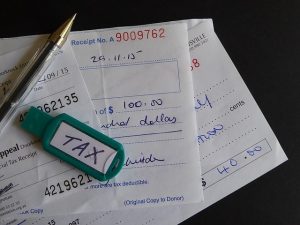 Preparing for tax season can be overwhelming for a small business owner. A good system that organizes receipts makes a big difference and helps you file an accurate tax return and protect yourself in case of an audit. Try these tips this year.
Preparing for tax season can be overwhelming for a small business owner. A good system that organizes receipts makes a big difference and helps you file an accurate tax return and protect yourself in case of an audit. Try these tips this year.
Keep Every Receipt
The Cohen Rule allows taxpayers to provide reasonable estimates for expenses when they can’t produce actual records of their expenses. IRS Publication 463 also states that taxpayers don’t need to save receipts for expenses under $75. However, saving every receipt allows you to prepare an accurate tax return and helps you win an audit.
Take Notes on Your Receipts
To prevent you from mixing business and personal expenses, record the details of each purchase on your receipts. Note what you purchased, and include why you bought the item. This step is especially important for entertainment and meals where you need to prove that you took clients to lunch and talked about business.
Use a Business Journal
Vending machine coffee and certain other business expenses will not have a receipt. Use a business journal to track those random expenses. Take a few minutes at the end of each day to write down all your daily expenditures on your Google or Outlook calendar. Print those pages at the end of your tax year to show all the miscellaneous expenses you purchased throughout the year.
Don’t Depend On Credit Card Statements or Canceled Checks
You do want to save your credit card statements and canceled checks, but they don’t always prove an expense. For example, your statement could show that you spent $400 at Staples, but you need to have solid proof for the IRS that you used that money to purchase office supplies for your business and not invitations for your daughter’s birthday party.
Avoid Using Cash
Cash is easy to spend and difficult to track. Use your debit or credit card instead as you ensure good record keeping. If you do have to use cash, be vigilant about recording details on the receipts or in your business journal.
Scan and Store Receipts for at Least Six Years
The IRS can perform an audit up to six years after you file your taxes. Be prepared when you scan your receipts before they fade and then store them electronically. Be sure to save them to Dropbox, OneDrive or another cloud-based storage option instead of relying on a hard drive that could crash and take your receipts with it.
Your small business may never be audited, but you want to be prepared. Keep good records and organize your receipts this year as you reduce your risk of a high tax bill after an audit.





